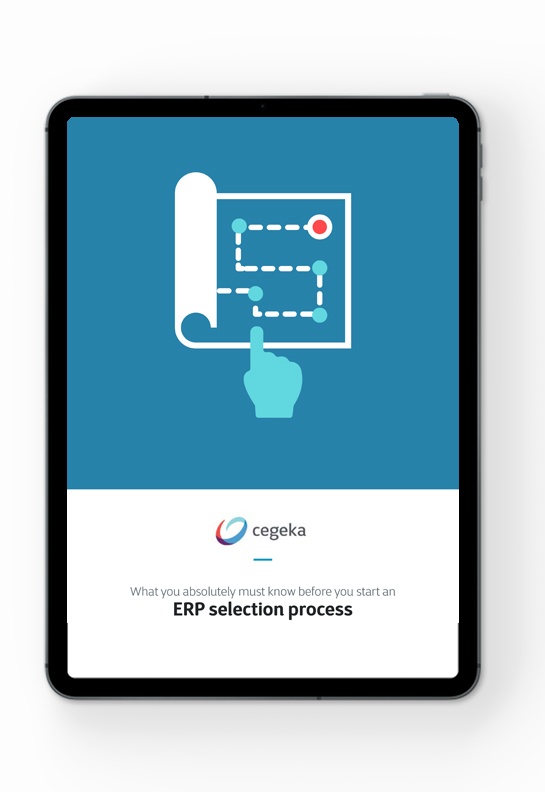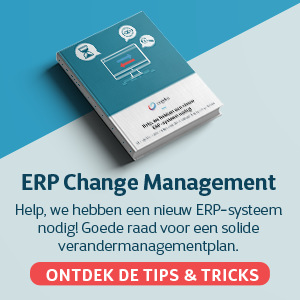As you know, implementing an ERP is no walk in the park. During implementation, bottlenecks or problems may arise, and these are usually the result of recurring pitfalls. So before you actually start implementing your ERP, it is vital that you cover a few very important points. Only then can you turn those high-risk elements into success factors. Let's take a look at the four most important things you need to do when you start preparing for your ERP project.
1. Make sure your key team members are available as soon as possible
People, not processes, it is said. And an ERP project is just the same – not so much about the technology but about the business itself – and that is carried out by people. You will need these key people before, during and after the project to perform a variety of tasks: defining objectives, providing input, migrating data, managing changes, testing the solution, training, validating... These key people will be those who know all your business processes, down to the last detail. They will show leadership and they will know your industry extremely well.
Because these employees are so important, it is essential to book their time as early as possible – often months or even a year before the project is launched. Now is the time to work with your HR department in looking at how to deal with these daily tasks. If you don’t free up these key team members, this will have a negative impact on the quality of both their day-to-day roles and their input, testing and training for your project. This could ultimately compromise the success of your project.
2. Get to the heart of the problem
Let's say that an ERP is going to be at least part of the solution. Now is the time to decide what you want to get out of your new system. Which functionalities are must-haves and which are nice to have? To work this out, you need to identify your essential processes with the help of colleagues from other departments. What is the main objective of the new system? That may seem obvious, but once you really start digging into your goals, you will realize how important they are for defining the scope of your project. Is the purpose of implementation mainly to improve efficiency? Or perhaps to harmonize different entities after a merger? Each requires a different approach and has different scope. Setting out goals can be especially important as it provides a guideline and helps to focus on your priorities during the project.
Try to keep your targets as measurable as possible. Remember: an ERP project is a business project, so it is about business objectives. Make your objectives specific, relevant and realistic for all stakeholders – the ERP project team, your internal organization and your ERP partner. If you have not defined your goals in clear terms, you will face two major pitfalls:
-
During the project you may run into ''scope creep'' – this is where users make requests, but you are not sure how valid they are or if they contribute to the main goal.
-
Later on, it becomes difficult to know if the project was successful or not.
3. Set realistic budgets
Setting a budget is no easy task. You will need to include the services of your ERP partner, your licenses, the cost of your in-house staff or HR service providers, as mentioned in the first point, and the desired level of support you get afterwards. Because every budgeting decision starts with the allocation of roles and responsibilities, the RACI model can be helpful here:
- Responsible: who is responsible for carrying out a task?
- Consulted: who provides the necessary input?
- Informed: who needs to be kept up to date?
- Accountable: who is ultimately responsible for the correct and timely implementation?
When dividing tasks between you and your ERP partner, this model can be of tremendous value. For each stream, i.e. tests, data migration, security, reporting, etc., you can choose what you would like to do yourself and what your partner could take on. Distributing these tasks effectively will be an important factor in determining the cost of your ERP implementation, and it will also ensure that everyone knows exactly what they are responsible for.
4. Identify ERP partners and solutions
Perhaps now you are fully prepared for your project. But your ERP partner also needs to understand your needs and wishes – and preferably also your industry. Screening vendors is very important. Which vendor does not only agree with you, but also dares to challenge you? Who speaks your language? Who has already completed several successful ERP projects? And, equally important, who do you get along with?
Meanwhile, you can also do research on what ERP platforms are available: you will have a good idea of what your needs are, so you can make a good first analysis of what systems will match those needs. Your priorities may include user-friendliness, good integration, high functionality and flexibility.
Find out more about how to effectively prepare for ERP implementation, and the success factors, risks and pitfalls in our free e-book, ‘the ERP Selection Process’. Would you like to find out how Cegeka tackles ERP challenges? Discover what we can do for you.






